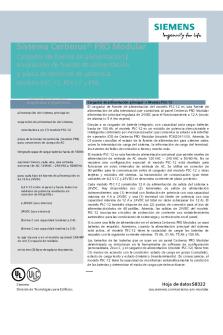PSC 2439-13 - PSC 2349 with Professor Kaplan PDF

| Title | PSC 2439-13 - PSC 2349 with Professor Kaplan |
|---|---|
| Course | International Political Economy |
| Institution | George Washington University |
| Pages | 2 |
| File Size | 44 KB |
| File Type | |
| Total Downloads | 93 |
| Total Views | 133 |
Summary
PSC 2349 with Professor Kaplan...
Description
PSC 2349-13 2/23/2016 Trade, Labor, and the Environment Q: What is the “progressive dilemma”? How do you balance the benefits of migration against the potential costs? Q: Can you think of policy measures that might minimize the risk that migration will have negative consequences? What happened in Dec. 2015 in Paris? - Paris Climate Agreement - Is this agreement legally binding? No. o Compared to the trade world, the Kyoto Protocol was binding o Legally binding can be controversial; get a environment agreement that is legally binding through the US Senate - Similar to the UN Development Goals, priorities highlighted by international community - Beginning on Earth Day 2016, 55 countries will sign the agreement immediately, and the rest will have a year to sign onto the targets - Targets: o EU => reduce emissions by 40% of their 1990 levels by 2030; these are the kinds of targets that each country is coming up with o So what’s binding in this agreement? There is a review process every 5 years or so to check how far countries have progressed with respective targets - Overall goal: bring down global warming levels - Trade leakages: o Price dropping leading to higher consumption somewhere else in the globe o Prisoner’s dilemma framework that applies to trade o Firm relocation o Cheap cost of fossil fuels and etc. leading to another firm’s goods being purchased - Border Tax (Frankel) => is it in line with the WTO? o Do border taxes make environmental institutions have more teeth? o Companies would say no because of trade leakages – there would be regulations that affect costs of production that would cause them to lose to other firms; but there would be the same effects anyways if other firms take their comparative advantages Oatley - Pg. 79 => British journalist talking about the importance of Heckscher-Olin o “Many people believe that while the world would gain…” o Building an argument regarding immigration
-
-
-
o Viewpoint on immigration => immigration itself is not the problem, but rather it's the country’s policy regarding immigration is the problem Assimilation into society/ inclusion o John Kenneth: migration is the oldest action against poverty; it is good for the country to which they go o What is the perversity in the human soul that resists this? Argument for factors-proportional analysis Goodhart’s point => talks about the progressive dilemma; progressives want a multicultural, diverse society, but this might come at the expensive of another value, which would be higher taxes in order to ensure a progressive economy o Solidarity: people’s willingness to redistribute Solidarity v. diversity: people are less willing to cooperate with welfare systems if they cannot connect with them Psychology literature regarding “in groups” and “out groups” Country examples of Sweden and Denmark US Example (more diverse example) o Pg. 88 piece about the welfare state Solutions for a welfare state: o Focusing on national history, crating a more integrated society through history o The US has always been a country of immigrants Pushback: things are path dependent and change is difficult – there is something deeper ingrained in society that makes integration difficult Domestically, there is conditionality and the welfare system. Is this responsible for the progressive dilemma? o Pg. 92: Welfare should be blind to ethnicity and religion, but not to behavior (US normative standpoint)
Mid-term review - Baghwadi => since comparative advantage changes so quickly, one country may be endowed in one factor on one day, but the next day it might be endowed in a different factor (kaleidoscopic advantage). So why is this important? o If you choose to protect a comparative advantage, it can always change o Your own comparative advantage can change very quickly with trade agreements, which could create trade diversions with thin margins o...
Similar Free PDFs

PSC 161 - Week 1
- 7 Pages

PSC 168 Notes
- 42 Pages

PSC vs PBC - Hepatische Erkrankungen
- 44 Pages

PSC 135 - Final Exam Questions
- 4 Pages

PSC 162 Lecture Notes
- 4 Pages

PSC 100-1001 Summer
- 7 Pages

EXAM 3 PSC
- 7 Pages

PSC 2107 Syllabus
- 9 Pages

PSC Chapter 4 quiz F1016
- 2 Pages

DRDP2015 PSC 090116-1 - Notes
- 86 Pages

PSC 308; Devil in the Grove
- 2 Pages

PSC Exam 1 Study guide
- 5 Pages
Popular Institutions
- Tinajero National High School - Annex
- Politeknik Caltex Riau
- Yokohama City University
- SGT University
- University of Al-Qadisiyah
- Divine Word College of Vigan
- Techniek College Rotterdam
- Universidade de Santiago
- Universiti Teknologi MARA Cawangan Johor Kampus Pasir Gudang
- Poltekkes Kemenkes Yogyakarta
- Baguio City National High School
- Colegio san marcos
- preparatoria uno
- Centro de Bachillerato Tecnológico Industrial y de Servicios No. 107
- Dalian Maritime University
- Quang Trung Secondary School
- Colegio Tecnológico en Informática
- Corporación Regional de Educación Superior
- Grupo CEDVA
- Dar Al Uloom University
- Centro de Estudios Preuniversitarios de la Universidad Nacional de Ingeniería
- 上智大学
- Aakash International School, Nuna Majara
- San Felipe Neri Catholic School
- Kang Chiao International School - New Taipei City
- Misamis Occidental National High School
- Institución Educativa Escuela Normal Juan Ladrilleros
- Kolehiyo ng Pantukan
- Batanes State College
- Instituto Continental
- Sekolah Menengah Kejuruan Kesehatan Kaltara (Tarakan)
- Colegio de La Inmaculada Concepcion - Cebu



